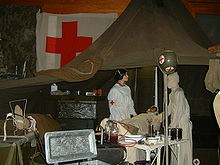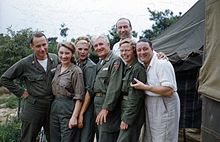
Back طب عسكري Arabic Hərbi tibb Azerbaijani Ваенная медыцына Byelorussian Военна медицина Bulgarian Medicina militar Catalan پزیشکیی سەربازی CKB Sanitetsgast Danish Wehrmedizin German Sanidad militar Spanish پزشکی نظامی Persian
| Part of a series on |
| War (outline) |
|---|
 |











The term military medicine has a number of potential connotations. It may mean:
- A medical specialty, specifically a branch of occupational medicine attending to the medical risks and needs (both preventive and interventional) of soldiers, sailors and other service members. This disparate arena has historically involved the prevention and treatment of infectious diseases (especially tropical diseases), and, in the 20th century, the ergonomics and health effects of operating military-specific machines and equipment such as submarines, tanks, helicopters and airplanes. Undersea and aviation medicine can be understood as subspecialties of military medicine, or in any case originated as such. Few countries certify or recognize "military medicine" as a formal speciality or subspeciality in its own right.
- The planning and practice of the surgical management of mass battlefield casualties and the logistical and administrative considerations of establishing and operating combat support hospitals. This involves military medical hierarchies, especially the organization of structured medical command and administrative systems that interact with and support deployed combat units. (See Battlefield medicine.)
- The administration and practice of health care for military service members and their dependents in non-deployed (peacetime) settings. This may (as in the United States) consist of a medical system paralleling all the medical specialties and sub-specialties that exist in the civilian sector. (See also Veterans Health Administration which serves U.S. veterans.)
- Medical research and development specifically bearing upon problems of military medical interest. Historically, this encompasses all of the medical advances emerging from medical research efforts directed at addressing the problems encountered by deployed military forces (e.g., vaccines or drugs for soldiers, medical evacuation systems, drinking water chlorination, etc.) many of which ultimately prove important beyond the purely military considerations that inspired them.